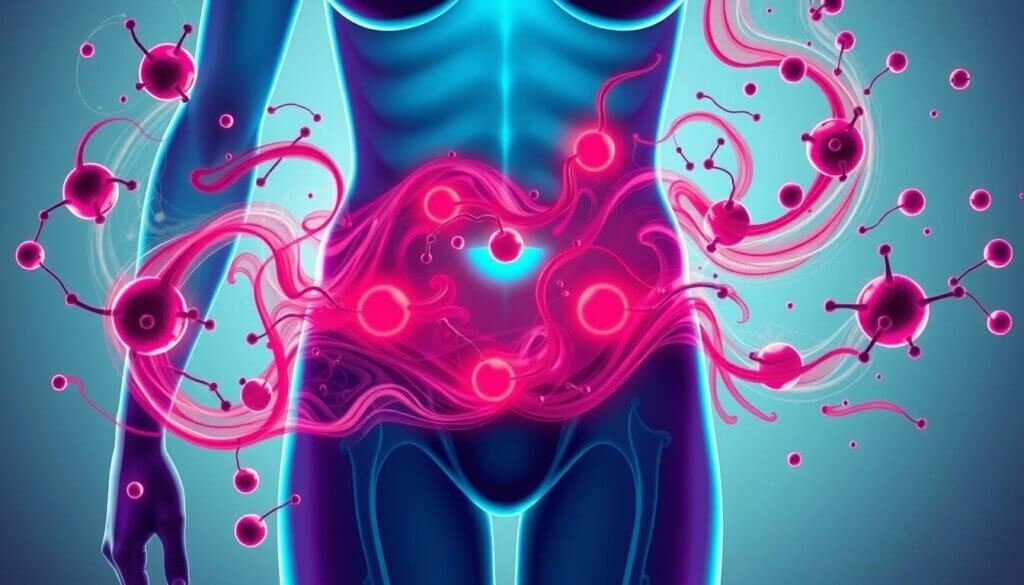Did you know up to 40% of adults struggle with stubborn belly fat? This problem persists even with regular diet and exercise. Hormone imbalances are often the cause. Knowing how hormones affect fat can help you lose that stubborn belly fat and get the body you want.
We’ll explore how hormones impact fat storage, especially around the belly. We’ll look at common hormonal imbalances that lead to belly fat. Then, we’ll share effective ways to balance your hormones and lose that belly fat for good.

Key Takeaways
- Hormones play a critical role in regulating fat storage, particularly in the abdominal area.
- Imbalances in key hormones like estrogen, cortisol, and insulin can lead to increased belly fat.
- Understanding the underlying hormonal causes of belly fat is essential for developing effective, long-lasting solutions.
- Adopting lifestyle strategies to balance hormones can help you achieve a slimmer, more toned midsection.
- Targeted exercise and dietary approaches can also help counteract hormone-related weight gain.
Understanding Hormonal Belly Fat and Its Common Causes
Hormonal imbalances can lead to belly fat buildup. Key hormones affect where and how much fat we store. Knowing their role helps tackle belly fat effectively.
Key Hormones That Influence Fat Storage
Estrogen and progesterone play big roles in fat storage. An imbalance in these hormones can cause more belly fat. Cortisol and thyroid hormones also play a part in belly fat.
Why the Midsection Is Most Affected
The belly area is very sensitive to hormone changes. This is because it has lots of fat cells. Hormonal shifts, like during the menstrual cycle or menopause, affect fat distribution in women.
Signs of Hormone-Related Weight Gain
- Stubborn belly fat that is resistant to diet and exercise
- Difficulty losing weight, even with a calorie-restricted diet
- Irregular menstrual cycles or menopausal symptoms
- Fatigue, mood swings, and difficulties with concentration
- Increased cravings for carbohydrates or sugary foods
Knowing the hormonal causes of belly fat helps. Recognizing signs of hormone-related weight gain is key. This way, you can balance your hormones and target belly fat.
The Critical Role of Estrogen in Fat Distribution
Estrogen is a key hormone for women, affecting how fat is stored and distributed. As we get older, our estrogen levels change. These changes can affect where we store extra fat, especially around the belly.
In our younger years, estrogen helps keep fat in the hips, thighs, and buttocks. But as we near menopause, estrogen drops. This leads to more fat around the belly, known as “estrogen dominance.”
Men can also face issues with estrogen levels and belly fat. When their estrogen goes up, they might see more fat around their waist. This calls for specific hormone imbalance belly fat treatment.
To tackle estrogen and belly fat issues, it’s key to work with healthcare experts. They help find the hormonal imbalance’s cause and create a plan to fix it. This might include changing what we eat, managing stress, and using supplements to support estrogen.
“Keeping estrogen levels healthy is vital for fat distribution and metabolic health. By tackling hormonal imbalances, we can control our bodies and look younger.”

Every person’s hormones are different, so a custom plan is needed for estrogen and belly fat issues. With your healthcare team’s help, you can find the best ways to manage your body’s fat and feel great.
Cortisol: The Stress Hormone's Impact on Belly Fat
Understanding the link between cortisol and belly fat is key to fighting weight gain from stress. Cortisol, our main stress hormone, contributes to belly fat buildup, known as the “cortisol belly.” We’ll look into how stress hormones affect our waistlines and find ways to stop the cycle of stress, cortisol, and fat.
How Chronic Stress Affects Weight Gain
When stress is constant, our bodies make too much cortisol. This hormonal imbalance can make us hungrier, crave high-calorie foods, and slow down our metabolism. This leads to weight gain, especially around the belly.
Breaking the Stress-Cortisol-Fat Cycle
To fight the cortisol belly fat link, we must tackle chronic stress. By using stress management techniques, we can balance our hormones and reduce cortisol’s effect on our weight. Some effective methods include:
- Practicing mindfulness, meditation, or deep breathing exercises
- Engaging in regular physical activity, such as yoga or walking
- Prioritizing quality sleep and relaxation
- Seeking support from friends, family, or a mental health professional
Lifestyle Changes to Manage Cortisol Levels
Changing our lifestyle can also help manage cortisol and reduce belly fat from hormones. These changes include:
- Eating a balanced, nutrient-rich diet that supports hormonal balance
- Staying hydrated and limiting caffeine and alcohol intake
- Using adaptogenic herbs and supplements to help the body handle stress
- Doing regular exercise, focusing on stress-relieving activities
By tackling the cortisol belly fat connection and making these lifestyle changes, we can control hormone-related weight gain. This leads to a healthier, more balanced body.
Thyroid Function and Its Effect on Metabolism
The thyroid is important in the fight against belly fat. This little gland in the neck regulates how we use food for energy in our bodies. Thyroid hormones—such as T4 and T3—impact our calorie burn and fat storage, especially in our midsection.
Excess or deficiency in hormone production due to thyroid issues can lead to belly fat. Hypothyroidism, or underactive thyroid, slows metabolism. That makes it harder for the body to burn fat, causing more belly fat in many cases.
| Thyroid Condition | Effect on Metabolism | Impact on Belly Fat |
|---|---|---|
| Hypothyroidism (Underactive Thyroid) | Slows down metabolism, reducing energy expenditure | Increases the risk of weight gain, particularly around the midsection |
| Hyperthyroidism (Overactive Thyroid) | Speeds up metabolism, leading to rapid calorie burning | Can result in unintentional weight loss, but may not specifically target belly fat |
To tackle thyroid-related belly fat, see a healthcare professional. They can check your thyroid and suggest treatments and lifestyle changes. This might include medication, diet changes, and exercise to help your metabolism and fat loss.

Understanding the thyroid belly fat relationship is crucial. By improving thyroid health, you can balance your metabolism and manage belly fat. A holistic approach to health, including diet and stress management, is best for weight loss and overall well-being.
The Connection Between Insulin Resistance and Abdominal Fat
Hormonal belly fat has a lot to do with insulin resistance. Insulin controls blood sugar. If it’s resistant, it’s capable of making more fat build on the gut. Understanding the relationship of insulin and belly fat is the key to combating hormonal belly fat.
Blood Sugar Balance Strategies
To fight insulin resistance and reduce belly fat, we need to keep blood sugar stable. Here are some ways to do that:
- Eat foods high in fiber like fruits, veggies, and whole grains.
- Stay away from refined carbs and added sugars.
- Add protein to meals to help control blood sugar.
- Practice eating in moderation and be mindful of what you eat.
Diet Modifications for Insulin Control
There are also specific diet changes that can help improve insulin sensitivity and reduce hormonal belly fat. These include:
- Eat more healthy fats like those in avocados, nuts, and olive oil.
- Choose low-glycemic carbs that release sugar slowly.
- Add foods high in antioxidants like berries and leafy greens.
- Drink plenty of water all day.
Exercise Approaches for Insulin Sensitivity
Exercise is also a powerful tool against how to reduce belly fat from hormones. Certain exercises can improve insulin sensitivity and help lose belly fat:
| Exercise Type | Benefits for Insulin Sensitivity |
|---|---|
| Strength Training | Builds muscle, which helps control blood sugar. |
| High-Intensity Interval Training (HIIT) | Increases metabolism and improves insulin sensitivity. |
| Resistance Training | Helps muscles take up more glucose, improving insulin function. |
By using these strategies, diet changes, and targeted exercises, we can tackle the link between insulin resistance and hormonal belly fat.

Natural Solutions for Balancing Hormones and Reducing Belly Fat
You know you have a hormone imbalance which makes hard to lose your belly fat? You’re not alone. You can naturally balance your hormones to shed that excess weight. We’ll explore diet changes, supplements, stress management and lifestyle tweaks that can help you feel better.
Eating a diet full of nutrients is key to losing belly fat. Foods rich in vitamins, minerals, and healthy fats help your hormones stay in check. Some important foods include:
- Omega-3 fatty acids found in fatty fish, chia seeds, and walnuts
- Antioxidants from fruits, vegetables, and green tea
- Probiotics to support gut health and hormone metabolism
A few supplements can also be quite worthy in regards to balancing your hormones for losing belly fat. Adaptogens, such as ashwagandha and rhodiola, help you handle stress. And magnesium, zinc and B vitamins contribute to hormonal balance as well.
Stress management is another pillar of hormone imbalance belly fat treatment. Meditation, yoga and deep breathing reduce cortisol. This grounds you to be more calm, centered and balanced.
Also, you must change your lifestyle. Good sleep, stable blood sugar and regular physical activity help re-establish that balance. Reducing hormonal imbalances will also improve your overall health and allow you to lose weight.
“The secret to lasting weight loss lies in addressing the root causes of hormonal imbalances, not just the symptoms.”
Hormone-Specific Exercise Strategies for Fat Loss
To lose belly fat and balance hormones, it’s key to use exercise plans made just for you. Matching your workouts to your hormonal cycles boosts fat burning and keeps your metabolism healthy.
Best Workout Times Based on Hormonal Cycles
When you work out matters a lot for your hormones. Morning workouts can help with stress and losing weight because of high cortisol. On the other hand, doing strength training in the afternoon or evening boosts muscle and fat loss thanks to testosterone.
Exercise Intensity and Hormonal Response
How hard you exercise affects your hormones too. High-intensity interval training (HIIT) increases growth hormone and testosterone, key for less belly fat. Mixing HIIT with moderate exercises improves your hormone balance for fat loss.
Recovery Techniques for Hormone Balance
Rest and recovery are as vital as exercise. Using techniques like restorative yoga, deep breathing, and good sleep helps control cortisol and balances hormones for lasting fat loss. Prioritizing rest lets your workouts and hormones work together.
Looking for more tips and insights? Explore our other articles in our Fitness blog!
FAQ
What is the connection between hormone imbalance and belly fat?
Hormone imbalances can lead to belly fat. Changes in hormones like estrogen and cortisol affect how we store fat. The midsection is often hit hardest by these changes.
What are the common causes of hormonal belly fat?
Estrogen, progesterone, cortisol, and thyroid hormones control fat storage. Imbalances in these hormones, caused by stress or age, can lead to belly fat.
How does estrogen impact fat distribution in the body?
Estrogen is key in fat storage and distribution. Changes in estrogen, like during menopause, can cause more belly fat.
What is the relationship between cortisol and belly fat?
Stress and high cortisol levels can cause weight gain, especially in the belly. Cortisol promotes visceral fat, stored deep in the abdomen.
How does thyroid function affect metabolism and weight management?
The thyroid gland controls metabolism. Thyroid issues, like hypothyroidism, can slow metabolism and lead to weight gain, including belly fat. Fixing thyroid problems is key to managing belly fat.
What is the connection between insulin resistance and abdominal fat?
Insulin resistance, a sign of type 2 diabetes, is linked to belly fat. When insulin doesn’t work well, fat builds up in the midsection. Improving insulin sensitivity can help lose belly fat.
What are some natural solutions for balancing hormones and reducing belly fat?
Eating a hormone-friendly diet and reducing stress can help balance hormones and lose belly fat. Exercise and supplements can also support hormonal balance and fat loss.
How can exercise strategies be tailored to address hormonal imbalances and belly fat?
Workouts should match your hormonal cycles and intensity. Adding recovery techniques can help balance hormones and lose belly fat.

